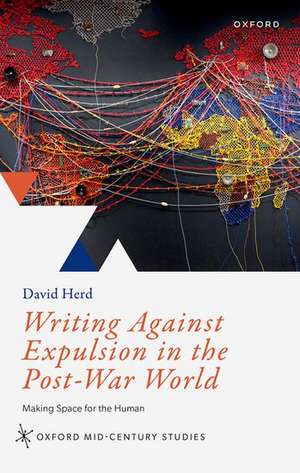Writing Against Expulsion in the Post-War World: Making Space for the Human: Oxford Mid-Century Studies Series
Autor David Herden Limba Engleză Hardback – 28 sep 2023
Preț: 485.38 lei
Preț vechi: 671.59 lei
-28% Nou
Puncte Express: 728
Preț estimativ în valută:
92.89€ • 100.86$ • 78.03£
92.89€ • 100.86$ • 78.03£
Carte tipărită la comandă
Livrare economică 12-18 aprilie
Preluare comenzi: 021 569.72.76
Specificații
ISBN-13: 9780192872258
ISBN-10: 0192872257
Pagini: 296
Dimensiuni: 140 x 223 x 22 mm
Greutate: 0.48 kg
Editura: OUP OXFORD
Colecția OUP Oxford
Seria Oxford Mid-Century Studies Series
Locul publicării:Oxford, United Kingdom
ISBN-10: 0192872257
Pagini: 296
Dimensiuni: 140 x 223 x 22 mm
Greutate: 0.48 kg
Editura: OUP OXFORD
Colecția OUP Oxford
Seria Oxford Mid-Century Studies Series
Locul publicării:Oxford, United Kingdom
Recenzii
Writing against Expulsion in the Post-War World is a timely and politically urgent study that connects postwar experiences of forced displacement and mass migration with our contemporary moment. Herd traces an important history of the "geopolitical non-person"—a dehumanized individual whose essential rights have been suspended. Reading poetic and philosophical works by Charles Olson, Hannah Arendt, and Frantz Fanon alongside first-hand accounts, government policies, and the Universal Declaration of Human Rights, Herd makes a powerful case for the relevance of literary analysis to real-life legal and political dilemmas. Blurring the boundaries between literary scholarship and activism, Herd delivers nothing less than a manifesto against the current political climate where detention, expulsion, and deportation have come to define the very conditions of civic life.
Writing Against Expulsion is one of those books that arrives in the world and immediately feels necessary. David Herd asks and brilliantly answers two questions about the condition of unwelcome migrants and the UK government: 'how did we get here' and 'how do we move away from where we are?' Drawing on and building from the works of writers such as Hannah Arendt, Frantz Fanon, the poet Charles Olson, as well as his own work with Refugee Tales, Herd re-casts conversations around 'political non-persons' to allow space for imagination, humanity and truth. A profound and inspiring book.
Writing Against Expulsion in the Post-War World is a lucid and compelling report on the individual at the mercy of the bureaucracy of immigration control, `the geo-political non-person`, and how the condition of this figure relates to the aftermath of the 1939-45 War and the subsequent moment of decolonisation. It takes us through the political, philosophical and literary contexts with fluency, passion and rigour. Its engagement with the texts through which the argument progresses is extensive and thoroughly persuasive, and allows the reader to witness the personal journey Herd himself travelled in understanding the issues that are the subject of this wonderful and important book.
Writing Against Expulsion is one of those books that arrives in the world and immediately feels necessary. David Herd asks and brilliantly answers two questions about the condition of unwelcome migrants and the UK government: 'how did we get here' and 'how do we move away from where we are?' Drawing on and building from the works of writers such as Hannah Arendt, Frantz Fanon, the poet Charles Olson, as well as his own work with Refugee Tales, Herd re-casts conversations around 'political non-persons' to allow space for imagination, humanity and truth. A profound and inspiring book.
Writing Against Expulsion in the Post-War World is a lucid and compelling report on the individual at the mercy of the bureaucracy of immigration control, `the geo-political non-person`, and how the condition of this figure relates to the aftermath of the 1939-45 War and the subsequent moment of decolonisation. It takes us through the political, philosophical and literary contexts with fluency, passion and rigour. Its engagement with the texts through which the argument progresses is extensive and thoroughly persuasive, and allows the reader to witness the personal journey Herd himself travelled in understanding the issues that are the subject of this wonderful and important book.
Notă biografică
David Herd is the author of numerous books of poetry and prose, including All Just, described by the Los Angeles Review of Books as 'one of the few truly necessary works of poetry written on either side of the Atlantic in the past decade', and Walk Song, a Book of the Year in the Australian Book Review. He has given readings and lectures in Europe, North America, India, and Australia and held visiting fellowships at George Mason University, Simon Fraser University, and the Gloucester Writers Center. He is Berry Chair of Literature & Human Rights at the University of St Andrews and co-organiser of the project Refugee Tales.














